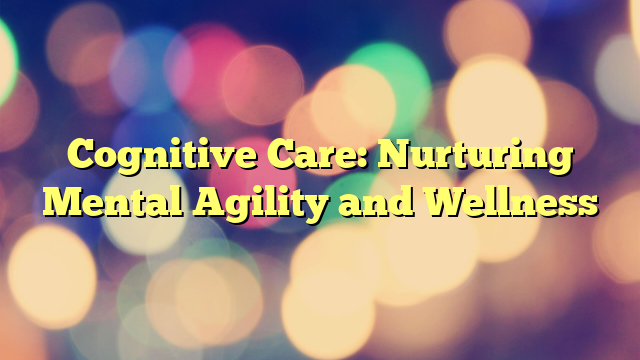Cognitive Care: Nurturing Mental Agility and Wellness

In today’s fast-paced and digitally-driven world, prioritizing our mental well-being is increasingly important. Cognitive care, also known as cognitive wellness, plays a crucial role in maintaining and improving our mental agility. By nurturing our cognitive abilities, we can enhance our problem-solving skills, memory, attention, and overall brain health. This article explores the significance of cognitive care and provides useful tips and strategies to foster mental agility and wellness.
The Importance of Cognitive Care
Cognitive care focuses on promoting and maintaining cognitive function, allowing individuals to effectively process information, think critically, and engage in complex mental activities. It is essential for people of all ages, from young children to older adults, as cognitive abilities play a vital role in everyday life. By taking care of our cognitive health, we can enhance our overall quality of life and achieve optimal mental performance.
Benefits of Cognitive Care
Investing time and effort into cognitive care can yield numerous benefits. Some of the key advantages include:
-
Improved Problem-solving Skills: By nurturing our cognitive abilities, we can enhance our capacity to solve problems efficiently and creatively. This skill is valuable in various personal and professional contexts. To improve problem-solving skills, consider engaging in activities such as logic puzzles, riddles, and strategy games. These activities challenge the brain and help develop critical thinking and analytical skills.
-
Enhanced Memory: Cognitive care can improve both short-term and long-term memory, allowing individuals to retain and recall information more effectively. To enhance memory, try incorporating mnemonic techniques, such as visualization or association, when trying to remember new information. Additionally, practicing memory exercises, such as memorizing lists or playing memory games, can help improve memory retention.
-
Increased Attention Span: With regular cognitive care, individuals can develop better focus and concentration, improving their ability to stay on task and avoid distractions. To increase attention span, consider practicing mindfulness exercises, such as focused breathing or meditation. These practices train the mind to stay present and focused on the task at hand.
-
Reduced Cognitive Decline: Engaging in activities that challenge the brain can help slow down cognitive decline, particularly as we age. It can also lower the risk of developing age-related conditions such as dementia and Alzheimer’s disease. To reduce cognitive decline, make a habit of regularly engaging in mentally stimulating activities, such as reading, learning a new language, or playing a musical instrument. These activities keep the brain active and promote brain plasticity.
Strategies for Nurturing Mental Agility
Now that we understand the importance of cognitive care, let’s explore some strategies that can help nurture mental agility and wellness.
1. Engage in Brain-training Activities
Regularly challenging the brain with activities such as puzzles, crosswords, and memory games can help improve cognitive function. These activities stimulate neural pathways, strengthen connections, and promote brain plasticity. Consider incorporating brain-training apps or online programs into your routine to provide a variety of cognitive challenges.
2. Stay Physically Active
Physical exercise is not only beneficial for the body but also for the mind. Engaging in regular aerobic exercises, such as walking, running, or swimming, increases blood flow to the brain, delivering essential nutrients and oxygen. This, in turn, helps improve cognitive function and mental clarity. Aim for at least 150 minutes of moderate-intensity exercise per week to reap the cognitive benefits.
3. Maintain a Healthy Diet
Proper nutrition is vital for overall brain health. Consuming a balanced diet rich in fruits, vegetables, whole grains, and lean proteins provides essential nutrients that support cognitive function. Incorporating omega-3 fatty acids, found in sources such as fish, flaxseeds, and walnuts, can also boost brain health. Additionally, staying hydrated is important for optimal brain function, so make sure to drink enough water throughout the day.
4. Get Sufficient Sleep
Adequate sleep is crucial for cognitive functioning. During sleep, the brain consolidates memories, processes information, and repairs itself. Aim for 7-9 hours of quality sleep each night to ensure optimal cognitive performance. Establish a consistent sleep routine, create a comfortable sleep environment, and avoid caffeine and electronic devices before bedtime to promote better sleep quality.
5. Practice Mindfulness and Meditation
Engaging in mindfulness practices, such as meditation or deep breathing exercises, can help reduce stress, improve focus, and enhance cognitive abilities. Regular practice can lead to increased mental clarity and overall well-being. Consider setting aside a few minutes each day for mindfulness exercises, such as mindful breathing or body scans, to cultivate a calm and focused mind.
6. Continuously Learn and Stimulate the Mind
Engaging in lifelong learning by exploring new subjects, hobbies, or skills can foster mental agility. Reading books, attending workshops, and participating in intellectual discussions are excellent ways to keep the mind sharp and active. Additionally, challenging yourself with mentally stimulating activities, such as learning a musical instrument or solving complex puzzles, can help maintain cognitive function and promote brain health.
7. Maintain Social Connections
Social interactions play a significant role in cognitive health. Spending time with friends, family, and engaging in community activities helps stimulate the brain, ward off feelings of isolation, and promote overall mental well-being. Make an effort to maintain strong social connections by scheduling regular social activities, joining clubs or organizations, or volunteering in your community.
Conclusion
Cognitive care is essential for nurturing mental agility and wellness. By prioritizing our cognitive health through brain-training activities, physical exercise, a healthy diet, sufficient sleep, mindfulness practices, continuous learning, and social connections, we can optimize our cognitive abilities and enjoy a higher quality of life. Remember, investing in cognitive care is an investment in our future mental well-being.
